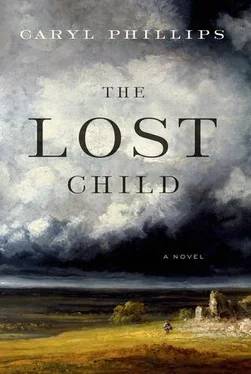The whole thing was depressingly straightforward. They simply pulled back a sheet, and he nodded and quickly turned his head. They’d closed Monica’s eyes, but they’d not done anything else for her, so her makeup was all streaked, and he could see that she was as thin as a rake. She looked emaciated. Bloody hell, Monica, it’s not right. The processing was swift; he signed two forms, and they told him that cremation was usual, unless he had other instructions, and they could send him the ashes if he so wished. After everything that had gone on, it just didn’t seem fitting to have her lying with Ruth. I’m sorry, Monica, but I can’t warrant it. And what was he going to do with ashes? What bloody use were ashes? They let him know that social services would be informing her son, and so at least he was spared that awkwardness, and then the nurse handed him a large envelope containing some letters and papers and said this was all Monica had. He wanted to ask about his wife’s gold watch, but he imagined that his daughter must have lost it or had it stolen from her possession, and so he said nothing, and that was it: his Monica was gone.
Mrs. Barrett leaned over and touched his arm. “Ronald, are you alright? Let me go in and make you a nice cup of strong coffee.” By the time he came back to himself, he realized that his neighbour was inside his bungalow by herself, and that’s when it occurred to him that he ought to get Monica’s envelope out of there and put it where it belonged. Really, he couldn’t risk his daughter’s effects going walkabout, for these days it was all he had left of her.
* * *
It was Mr. Gilpin who told Ben that a social worker would be coming around to see him in an hour or so. He’d scarcely stepped in the door from school, but Ben had a good idea of what was going on, and he’d been bracing himself for the visit. The week before, he had been to see David Bowie on his own, for at the last minute Mrs. Gilpin had banned Helen from going with him. When he came back from the concert, only Mr. Gilpin was up, sitting in a darkened living room, and the man looked as if he had been given the task of telling him something, but it was obvious that Mr. Gilpin couldn’t find it in himself to do so. When he got back from school and Mr. Gilpin told him that a social worker wanted to speak with him, he reckoned that this was it: this person would be telling him to pack his bags and get ready to move either to new foster parents or to a children’s home.
He heard Mr. Gilpin shout upstairs to him. When he came down, he could see that the young man had on big horn-rimmed glasses, behind which there was a sad look painted on his smooth, oval face. “Sit down, Ben.” Having spoken, Mr. Gilpin was quick to excuse himself, and he left them alone in the living room. As soon as he’d gone, the social worker cleared his throat and told him that there was no easy way to say this. “I’m sorry, Ben, but your mother’s passed away in London.” Ben looked at the man, but didn’t say anything. “Are you alright, Ben?” He had been sure that things couldn’t get any worse than they already were, with only Mr. Gilpin speaking to him. But right now Mr. Gilpin could stop talking to him if he wanted. He felt as if somebody had punched him hard, in the face, but it didn’t hurt. He couldn’t feel anything. The young man reached over and clumsily covered his hand. “I’m so sorry, Ben.” He wanted to pull his hand away, but it wasn’t this man’s fault. “I just want to let you know that your grandfather might be in touch. We’ve given him your details.”
* * *
After he finishes his pasta dish and pays up at the restaurant bar, he decides to stop off at one of the better bookshops and buy some notepaper and envelopes and then make his way back to the hotel. Once there he will write a short letter to his grandson, telling him that he would like him to have what is in the envelope, and letting him know that he is very sorry to have missed him. Having done so, he will then undertake the short walk back across town and deposit everything with the helpful college porter and leave it up to the lad as to whether or not he’s inclined to communicate. On returning to his hotel room, he discovers that an elderly cleaner is only now finishing off his room and emptying the wastepaper bins before readying herself to move on down the corridor, and so he stands stiffly to one side and waits. Once she closes in the door behind her, he takes off his jacket and hangs it on a wooden coat hanger in the wardrobe, and then he remembers Mrs. Barrett’s message but he doesn’t feel in the right humour to call. After all, he knows full well that she will simply be anxious to know if he is feeling alright, and then she will want to be reminded of not only the time but the day he is coming back so that she might have a nice meal ready for his return. As he slips off his shoes and lies back on the bed, he tries not to think unkind thoughts about his neighbour, for he now understands that the poor woman’s erratic behaviour is all down to her memory’s gradually failing her. These days Mrs. Barrett is living increasingly in the present, which, he imagines, might not be such an unacceptable place to dwell.
* * *
After she died, Ben threw out all of her letters and postcards to him. He also got rid of the newspaper clippings about finding Tommy, and the articles to do with the trial of Derek Evans. He’d kept everything in a grey rucksack that he stashed under his bed, but a week or so after the visit from the young social worker he took the whole lot down to the skips behind the supermarket and hurled the bag in. The only thing he saved was a small black-and-white photograph of him and Tommy that was taken on the day they arrived at Silverdale by either Peter or Rachel, he couldn’t remember which one. He put the snapshot in his pocket and then went to the newsagents to buy ten Benson and Hedges and a box of matches. He sat on a bench on the Green where everyone could see him, and he smoked one fag after another until he’d finished half the pack, but nobody said anything to him, and if he was honest, he didn’t even like the taste of the cigarettes. More than anything, he wanted to believe that she’d done the best she could, but he just couldn’t get his head around the fact that she’d given him away, which meant that there was probably something the matter with him. Why didn’t she try harder and put him first? Why didn’t she want him? When he got back to the foster home, he found Mr. Gilpin sitting in the kitchen by himself, and he could see by the look on the man’s face that he could smell the smoke, but Mr. Gilpin didn’t say anything. Instead he just asked Ben if he wanted to talk about his mother, and he reminded the foster child that he was happy to listen. Ben shook his head. After a painfully uncomfortable silence, it was Mr. Gilpin who eventually got up from his stool and left his own kitchen without saying anything further.
* * *
When he opens his eyes, he can see shadows in the room, and the noises emanating from the street have a different, more subdued tone. It is immediately apparent that he must have fallen asleep, and so he turns his head. Sitting on top of the coverlet on the spare bed, he sees the envelope containing his daughter’s writing, and he notices on the desk the unopened pack of notepaper, with matching envelopes. Yesterday’s drive must have knocked the wind out of him, and last night he hadn’t got much sleep as he tossed and turned and worried about how to handle the upcoming day. He now knows that he should act decisively, and so, having opted to forget about writing a short letter, he stands and begins quickly to smarten himself up. He scurries across town, careful to dodge the platoons of swerving bicycles, and when he reaches the college, he sees that it is a different porter. He is a younger man with slicked-back hair, and he might even be the son of the fellow with whom he spoke earlier, for they appear to share a family face. He asks if Benjamin Wilson is in his room as he wishes to leave something for him. This seems to amuse the junior porter, who begins to chuckle.
Читать дальше












